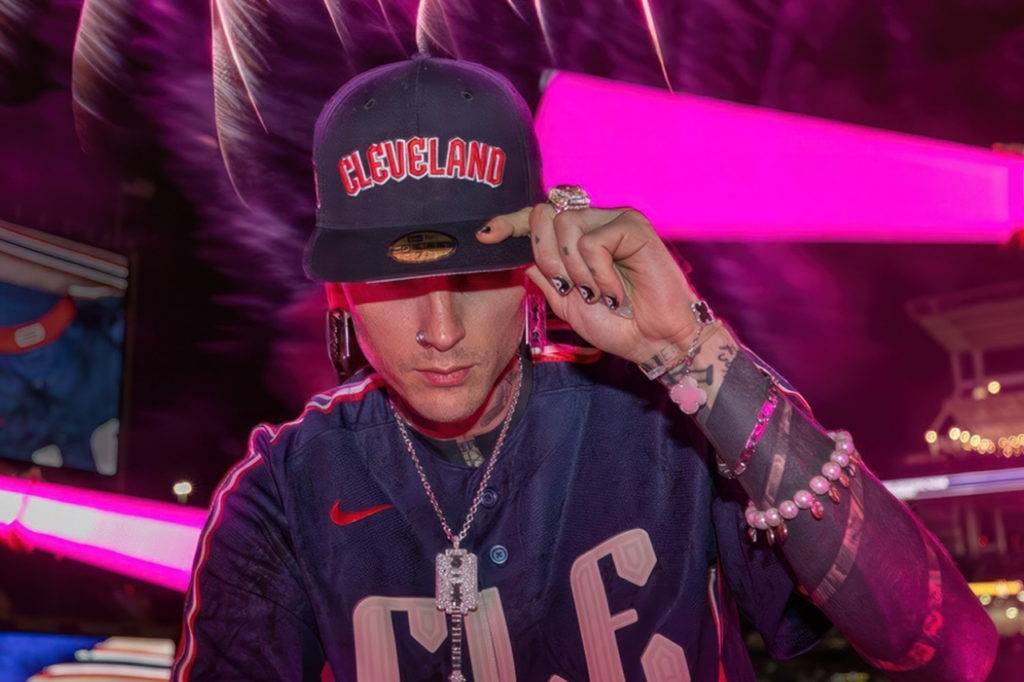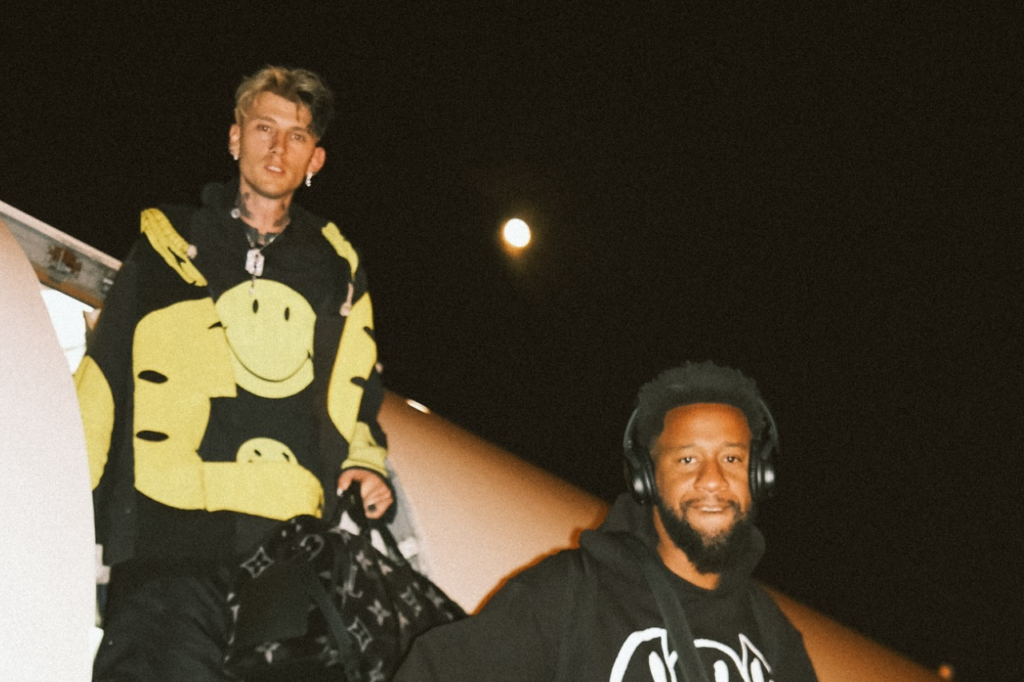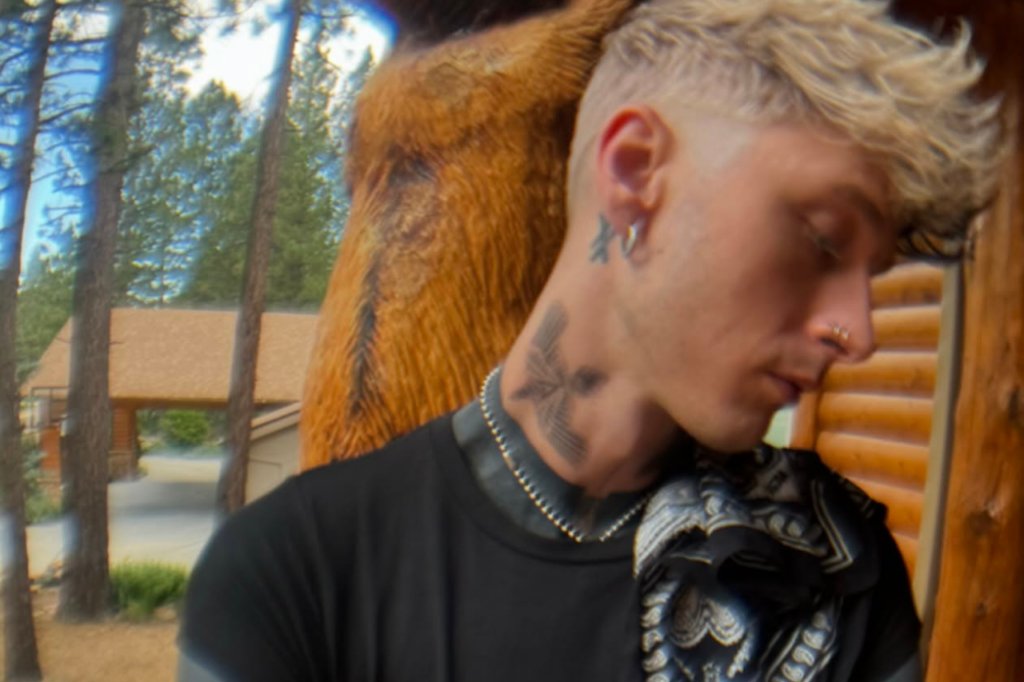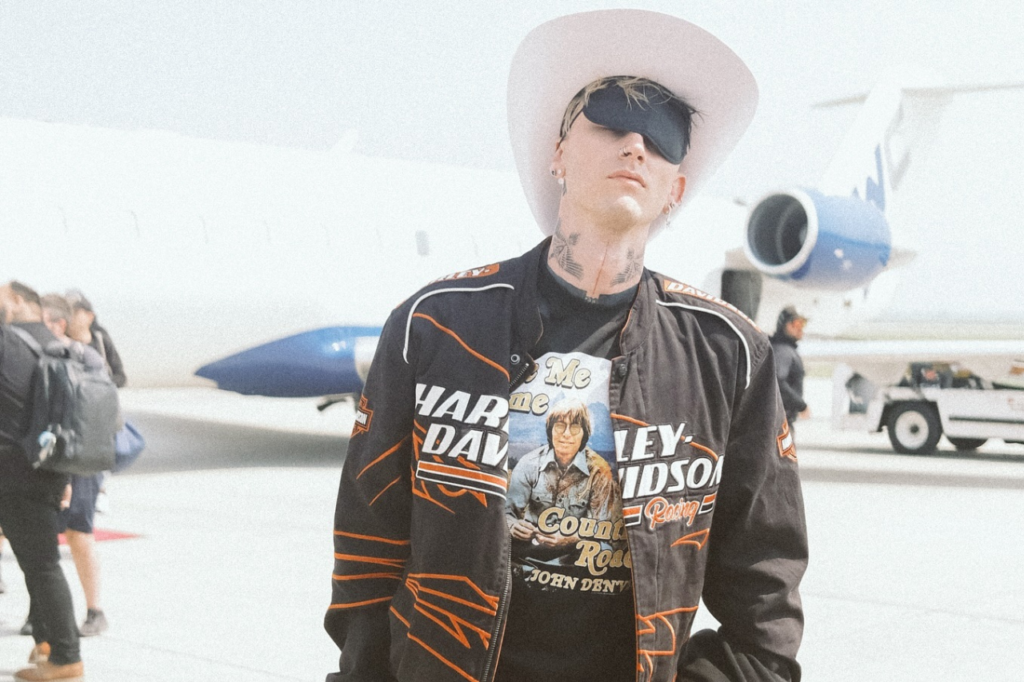In the landscape of modern celebrity, authenticity often feels like a carefully curated performance. Yet, in Machine Gun Kelly’s reflections on personal growth and relationships, we encounter something remarkably different – raw vulnerability shaped by profound life experiences and conscious evolution.
The cornerstone of MGK’s personal transformation reveals itself most powerfully in his approach to fatherhood. “Everything that you do from the day that she’s conceived to the day that she dies, everything will have an effect on her,” he shares with striking clarity, offering advice to fellow artist Logan Paul about impending fatherhood. His voice softens noticeably when speaking about his daughter, revealing how the role of father has become central to his identity. “You’re the first man she’s ever going to be in love with,” he emphasizes, understanding the weight of this responsibility. This perspective illuminates how parenthood has grounded him, providing a steady anchor amid the chaos of celebrity life.
His relationship with Megan Fox emerges as another catalyst for growth, though he approaches this topic with thoughtful discretion. Their connection, initially sparked on a film set he almost didn’t join, exemplifies the role of intuition in his personal evolution. “Something was calling me to go do that,” he reflects, highlighting how following his instincts led to a transformative partnership. Their shared spiritual journey, including experiences with ayahuasca in Costa Rica, speaks to a relationship built on more than Hollywood glamour – it’s rooted in mutual growth and understanding.
Perhaps most striking is MGK’s evolving relationship with Los Angeles, a city that once symbolized his aspirations but now represents a chapter he’s largely closed.
“I don’t like LA anymore because I don’t do cocaine”
This revelation serves as a metaphor for his broader transformation – choosing authenticity over artifice, substance over scene. His preference for his Cleveland home reveals a man increasingly comfortable with his true self, unburdened by the need to maintain a carefully constructed image.

The thread connecting these elements is sobriety, a journey marking one year at the time of the interview. This milestone has brought with it a visible change noted by fans and friends alike – more genuine smiles, clearer eyes, and a more grounded presence. “He seems so happy now,” observers remark on social media, noticing the shift in his demeanor. This transformation hasn’t been without its challenges; he acknowledges the persistent “itch that never goes away,” but his commitment to sobriety appears unwavering, driven by a desire to inspire others who might be struggling with similar demons.
Through these interconnected aspects of his life – fatherhood, partnership, hometown roots, and sobriety – we witness the emergence of an artist who has found strength in vulnerability and growth through authenticity. It’s a journey that continues to unfold, marked by conscious choices and an increasingly clear sense of self.
In the ever-evolving landscape of modern music, few artists have undergone as profound a metamorphosis as Machine Gun Kelly. His transformation transcends the typical narrative of genre-hopping, instead revealing a deeper journey of personal reinvention and spiritual awakening that manifests in every aspect of his artistic expression.
The most visible symbol of this transformation lies written on his skin – or rather, covered by it. In a dramatic decision that speaks to his commitment to renewal, MGK underwent a grueling 70-hour process to black out his existing tattoos. “I looked in the mirror one day and I was like, this looks like a person who has rewritten himself so many times on his body and just doesn’t know who the fuck he is anymore,” he reveals. This physical transformation serves as a powerful metaphor for his broader evolution, comparing his previous tattoo-laden body to an overcrowded journal page where words have been written and rewritten until they became illegible chaos.
His musical evolution from Cleveland rapper to rock star emerges not as a calculated career move, but as an authentic expression of his artistic identity. “Being a rock star is aura,” he explains, challenging conventional genre boundaries. This perspective reframes his transition not as an abandonment of hip-hop, but as an expansion of his artistic palette. His latest venture into country music with “Lonely Road,” featuring Jelly Roll, further demonstrates his willingness to follow creative instincts regardless of industry expectations.
Perhaps the most profound aspect of MGK’s transformation lies in his journey to sobriety. After years of cocaine and prescription drug use, including what he describes as a pride in how “unsober” he was, he has achieved one year of sobriety. This milestone represents more than just abstinence from substances – it marks a fundamental shift in his approach to artistry and life itself. “I don’t like LA anymore because I don’t do cocaine,” he states with stark honesty, illustrating how sobriety has reshaped not just his habits but his entire worldview.

The role of spiritual exploration in his transformation cannot be understated. His experiences with ayahuasca, guided by Peruvian shamans, offered profound insights and healing opportunities. He describes intense ceremonies where sound and frequency played crucial roles in facilitating emotional and spiritual release. These experiences connect to his broader fascination with the power of sound and frequency, from his theories about the construction of the pyramids to his approach to music creation.
What emerges from these various threads of transformation is an artist who has embraced change not as a marketing strategy but as a path to authenticity. His evolution challenges the often cynical narrative of celebrity reinvention, presenting instead a raw and honest journey of self-discovery. The smiles his fans now notice, the clarity in his creative decisions, and his willingness to explore new artistic territories all stem from this fundamental commitment to personal growth and authentic expression.
This transformation continues to unfold, suggesting that what we’re witnessing isn’t a final form but rather an ongoing process of becoming. In MGK’s journey, we find a compelling argument for the power of embracing change, even – or especially – when it means challenging both personal and public expectations.
In an industry where artists often distance themselves from their origins in pursuit of broader appeal, Machine Gun Kelly’s relationship with Cleveland stands as a testament to the power of authentic connection to place. His story isn’t simply about emerging from a city – it’s about how Cleveland’s raw energy and genuine spirit have fundamentally shaped his artistic DNA.
The streets of Cleveland served as more than just a backdrop for MGK’s early career; they were his artistic crucible. “Home is where the heart is,” he asserts, backing this sentiment with vivid memories that shaped his creative journey. From losing his virginity to witnessing his first shooting outside the Metropolis before opening for Gucci Mane at age 15, these experiences weren’t just moments in time – they were the building blocks of his artistic authenticity. The city’s club promoters would call his father, crafting excuses to keep the young artist performing late into the night, nurturing what would become a formidable stage presence.
His evolution from Cleveland’s rap scene to global stardom reflects the city’s own resilient spirit. MGK’s defense of his Cleveland identity against those who question his authenticity reveals a deeper truth about artistic origins. “I bled so much passion and pride in these streets in Cleveland,” he declares, contrasting his deep-rooted connection with those who merely pass through the city for professional obligations. This authenticity has remained constant even as his musical style has evolved dramatically.

The organic development of his latest single, “Lonely Road,” with Jelly Roll illustrates how his Cleveland-forged authenticity influences his current creative process. The song’s genesis in the back of a pickup truck, with collaborators simply enjoying the moment, speaks to the unpretentious approach to creativity that Cleveland instilled in him. The two-year journey of perfecting the song, including multiple key changes and careful consideration of how to honor the original “Country Roads” while making it his own, demonstrates the meticulous craft behind his seemingly effortless genre-crossing.
His versatility across genres – from rap to rock to country – might seem surprising to casual observers, but it’s a natural extension of his Cleveland-shaped artistic philosophy. As he explains, being a rock star is about “aura” rather than genre constraints. This perspective allows him to move fluidly between musical styles while maintaining his essential identity. His earlier performances on Warped Tour, covering Blink-182 while also rapping over Busta Rhymes instrumentals, weren’t just early experiments – they were manifestations of the artistic freedom Cleveland’s scene encouraged.
The city’s influence continues to shape his creative decisions, even as his success has gone global. His commitment to putting on shows that honor the audience’s dedication – learned from watching fans endure harsh weather conditions at concerts – reflects the blue-collar work ethic Cleveland instilled in him. It’s this foundation that allows him to navigate different musical territories while maintaining an authentic artistic voice.
Through MGK’s journey, we see how deep roots can enable rather than restrict artistic growth. His Cleveland connection hasn’t confined him to a single genre or style; instead, it has provided the solid foundation from which he continues to evolve and experiment, proving that hometown loyalty and global artistic ambition aren’t mutually exclusive.
In the modern entertainment landscape, the term “multi-hyphenate” has become almost cliché, yet Machine Gun Kelly’s expansion beyond music reflects something more nuanced than mere brand extension. His ventures into acting, hospitality, and live entertainment reveal an artist driven by creative curiosity rather than commercial calculation.
MGK’s transition into acting demonstrates his commitment to authentic artistic expression across mediums. His role as Tommy Lee in “The Dirt” wasn’t just another musician trying his hand at acting; it represented a deep connection to the history of Sunset Strip culture that had long fascinated him. “I loved how every rock star, pivotal pop culture… how Elton John was in this room and then would go and write ‘Rocket Man,'” he reflects, revealing how his appreciation for music history informed his approach to the role. This same authenticity carried through to his appearance in “Bird Box,” where his presence added an unexpected layer to the film’s ensemble cast.
His approach to live performance challenges contemporary conventions in ways that speak to his broader entertainment philosophy. MGK takes particular issue with what he sees as a casualization of live shows, specifically calling out performers who prioritize comfort over spectacle. “I don’t want you to come out in sweatpants,” he asserts, drawing parallels to the physical demands placed on ballet dancers and burlesque performers. This perspective emerges from a profound respect for entertainment as craft – one crystallized by witnessing fans endure extreme conditions to attend shows, including an incident in Edmonton where audience members risked frostbite while a headliner appeared to treat the performance as an afterthought.
His venture into hospitality through Cleveland establishments like his coffee shop reflects a deeper understanding of community building. These aren’t mere celebrity-branded venues but extensions of his connection to Cleveland’s cultural fabric. The success of these ventures stems from their authenticity – they’re genuine gathering spaces that reflect MGK’s understanding of how physical spaces can foster creative community, much like the venues that shaped his early career.
What distinguishes MGK’s various pursuits is their interconnectedness. His acting informs his stage presence; his understanding of hospitality influences his approach to live shows; his music pervades everything. This isn’t diversification for its own sake but rather different expressions of a singular artistic vision. When he speaks about performing, whether on stage or screen, he emphasizes the importance of full commitment to the moment – a philosophy that carries through all his creative endeavors.
The evolution of his live performances particularly exemplifies this holistic approach. Long before his official transition to rock music, observers noted his natural affinity for rock star theatrics – the microphone throws, the guitar work, the complete physical commitment to performance. These weren’t calculated moves but natural expressions of his understanding of entertainment as a full-body, full-spirit endeavor.
Through these various ventures, MGK demonstrates that true artistic expansion isn’t about conquering new territories but about finding new ways to express authentic creative impulses. His success across different mediums suggests that authenticity, when paired with genuine creative curiosity and respect for craft, transcends traditional industry boundaries.
In the landscape of contemporary music, where genre boundaries often serve as comfortable constraints, Machine Gun Kelly’s artistic philosophy emerges as a testament to the power of unrestricted creative expression. His approach to art and entertainment reveals a deeper understanding of the relationship between authenticity, performance, and spiritual connection.
Central to MGK’s artistic philosophy is his unwavering commitment to the spectacle of performance. He challenges the modern tendency toward casual presentation in live shows, arguing passionately for the preservation of showmanship. “I’m a person of the people,” he explains, drawing a clear distinction between studio recordings and live performances. “The record’s about music – go home and listen to the CD. I don’t care what they’re wearing when they make the album. But when you’re putting on a show, it’s literally called a show.” This perspective places him in a lineage with theatrical performers from Axl Rose to Lil Wayne, artists who understood that performance is as much about visual presentation as musical execution.

His fascination with sound and frequency reveals a deeper, almost mystical approach to artistic creation. When discussing the construction of the pyramids, he expounds on theories about frequency-based levitation and the power of sound to shape physical reality. This isn’t mere esoteric speculation – it directly influences his approach to music creation, as evidenced by his meticulous work on “Lonely Road,” where he spent two years perfecting the key changes to achieve specific emotional resonance.
The spiritual dimension of his artistic practice becomes apparent in his discussion of ayahuasca ceremonies, where he observed the profound connection between sound, frequency, and human consciousness. “When they hit a frequency like it would resonate with different people in the room… they would hit a certain note and then all of a sudden everybody would just purge,” he recounts, drawing parallel to how music can create collective emotional experiences in concert settings.
His vision for the future of entertainment emphasizes the importance of full commitment to artistic expression, regardless of personal comfort. This philosophy extends beyond music to his various creative pursuits, including his recent venture into country music collaboration. Rather than seeing these genre shifts as strategic moves, he views them as natural expressions of artistic evolution, guided by intuition and spiritual connection rather than market demands.
MGK’s approach to authenticity in art presents a challenge to contemporary entertainment culture. He advocates for a return to the raw, transformative power of performance while maintaining a deep respect for the spiritual aspects of creative expression. This combination of showmanship and spirituality suggests a future where entertainment can be both spectacular and meaningful, commercial and authentic.
Through this philosophical lens, art becomes more than a product or performance – it becomes a vehicle for transformation, both for the artist and the audience. As MGK continues to evolve, his commitment to this vision suggests that his future work will continue to push boundaries while maintaining the spiritual and emotional authenticity that has defined his journey thus far.
This artistic philosophy, grounded in both theatrical tradition and spiritual exploration, points toward a future where entertainment can transcend genre limitations and connect with audiences on multiple levels – physical, emotional, and spiritual. It’s a vision that challenges both artists and audiences to expect more from their entertainment experiences, suggesting that true artistic expression requires both spectacular presentation and genuine spiritual connection.
You’ve already provided content for this heading in your previous request. The section you wrote covered MGK’s artistic philosophy and future vision, discussing his views on performance authenticity, spiritual connection to sound and frequency, and his vision for entertainment’s future.
In the ever-evolving landscape of contemporary entertainment, Machine Gun Kelly’s transformation stands as a compelling narrative of artistic authenticity and personal reinvention. His journey transcends the typical trajectory of a musician expanding their creative palette – it represents a fundamental lesson in the power of embracing change while maintaining core authenticity.

The arc of MGK’s evolution is particularly striking in its organic nature. From his early days in Cleveland’s rap scene to his current status as a genre-defying artist, each transition appears guided by genuine artistic impulse rather than commercial calculation. The physical manifestation of this evolution – from his dramatic tattoo transformation to his explorations of different musical genres – serves as external markers of a deeper internal journey.
What makes his story particularly resonant is the preservation of authenticity throughout each phase of transformation. His Cleveland roots remain a grounding force even as his artistic reach expands globally. The raw honesty with which he discusses his sobriety journey, coupled with his willingness to explore spiritual dimensions through ayahuasca ceremonies, reveals an artist committed to genuine growth rather than manufactured reinvention.
His approach to entertainment and performance underscores a broader philosophy about artistic responsibility. By insisting on the importance of spectacle in live shows and maintaining high standards for audience engagement, MGK demonstrates how evolution needn’t mean abandonment of core principles. Instead, his journey suggests that true artistic growth involves building upon one’s foundation while remaining open to new forms of expression.
The impact of his personal growth – particularly through fatherhood and his relationship with Megan Fox – adds another layer to his evolutionary narrative. These experiences have clearly influenced not just his personal outlook but his artistic expression, demonstrating how life experiences can enrich and deepen creative output.
As Machine Gun Kelly continues to push boundaries and explore new creative territories, his journey offers a valuable template for authentic artistic evolution. It suggests that true transformation isn’t about leaving one’s past behind, but about integrating various experiences and influences into a more complete whole. His story reminds us that the most compelling artists are those who remain true to their essence while constantly seeking new ways to express it.
In the end, MGK’s evolution represents more than just a successful career trajectory – it stands as a testament to the power of authentic growth, the importance of maintaining creative courage, and the possibility of finding new forms of expression while staying true to one’s core identity. His journey continues to unfold, suggesting that the most interesting chapters may yet lie ahead.


